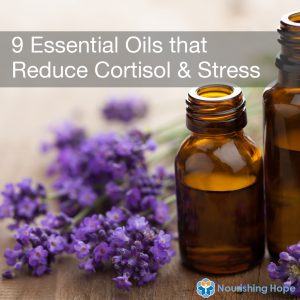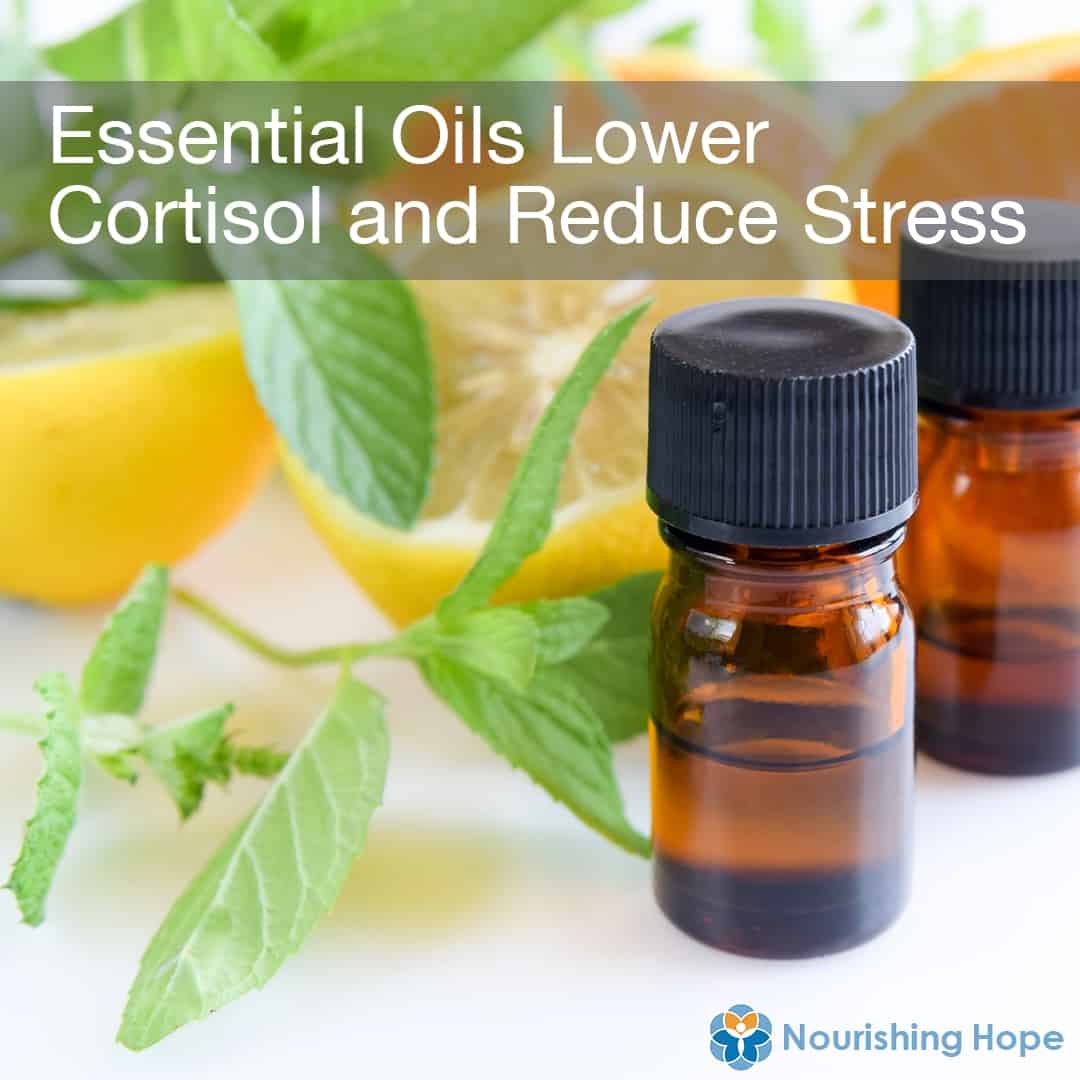Wondering how I became so interested in essential oils?
In fact, it turns out to be a combination of personal and professional reasons that encouraged me to look for an essential oil solution.
You see, one of my favorite supplements for lowering cortisol, a phosphorylated serine (not phosphatidylserine) product was unavailable for a period of several months. It was the only product on the market of its kind, and other alternatives didn’t seem to work as well for me and other people.
I’ve been using essential oils personally for a long time, longer than I have been a nutritionist actually, so I decided to look into the research on which essential oils might help.

Since research clearly indicates that children with ASD (especially lower-functioning children with ASD) exhibit significantly higher levels of cortisol than typical children [1], and because I used to take this supplement myself to lower my cortisol in the evening, I started digging around for other natural alternatives to decrease cortisol levels for my clients and myself.
In this article, I’ll discuss studies on essential oils that show promising results in lowering cortisol levels and improving the body’s stress response.
But let’s set the record straight first: Cortisol is not the enemy here
Also known as the ‘stress hormone’, cortisol is often considered as public health enemy number 1. But the truth is that cortisol is not the bad guy.
Produced from cholesterol by the two adrenal glands situated on top of the kidneys, this steroid hormone, is in charge of:
- Regulating energy levels to help the body meet its physiological demands.
- Working with the body to help it deal with the stressor. For instance, cortisol triggers a burst of energy while also suppressing the digestive, reproductive and immune systems – this helps direct all the energy available to either fighting the stressor or fleeing it.
- Helping the body bounce back after exposure to stress.
However, chronically elevated cortisol levels can spell trouble for your health
The body uses various feedback loops to regulate the production of cortisol – this healthy ‘habituation’ or ‘adaptation’ process ensures that the Hypothalamus-Pituitary-Adrenal (HPA) axis is not chronically activated.
The issue is that being consistently exposed to significant stressors can make some people unable to adequately habituate to the daily stress they face. This can eventually lead to a dysfunction of the HPA axis, at which point cortisol levels will be high.
Research indicates that chronically elevated cortisol levels increase the risk of [2]:
- Weight gain and obesity
- Insulin resistance
- Diabetes
- Cardiovascular diseases
- Autoimmune diseases secondary to the suppression of the immune system
- Gastrointestinal issues due to worsening gut health
- Fertility problems
Natural stress relief strategies that will stabilize your cortisol levels
- Just eat real foods including probiotic foods.
- Keep your blood sugar levels steady by enjoying healthy fats and proteins at every meal.
- Review the quality of your sleep – avoid using electronic devices just before sleep since the blue light they emit disrupt circadian.
- Implement stress management strategies such as deep breathing exercises, spending time outdoors or practicing ‘earthing’ (barefoot walking or running).
- Be as active as you can.
Already implementing the above strategies? Then give essential oils a try but make sure you know how to select and use them.
 How can essential oils help regulate your cortisol levels?
How can essential oils help regulate your cortisol levels?
1. In one study, inhalation of essential oils was shown to considerably reduce salivary cortisol concentrations among pre-hypertensive and hypertensive patients when compared to cortisol concentrations in the placebo group (exposed to artificial fragrance) and control groups (no interventions) [3]. Participants who inhaled the essential oils also experienced significant improvements in their daytime blood pressure levels.
According to earlier research [4], it appears that inhaling essential oils can help improve the body’s stress response by toning down the activity of the sympathetic nervous system, also known as the ‘fight and flight response’ system. Moreover, essential oils also increase the activity of the parasympathetic nervous system which is often referred to as ‘the rest and digest’ system [4].
2. In a 4-week study involving inhalation of essential oil blends, researchers found that anxious and stressed hypertensive patients who inhaled the oils experienced considerably reduced serum cortisol and anxiety levels compared to the control and placebo groups [5]. The experimental group also showed improved psychological stress response, blood pressure regulation and pulse rate. However, no significant change was observed in terms of catecholamine levels among the three groups – the study duration or sample size may have been too small to detect any change. This being said, the other changes reported in the study are very encouraging.
3. Researchers also report that inhalation of lavender essential oils infused in a handkerchief helped to considerably reduce stress levels among heart and abdominal surgery patients compared to the control group [6]. Similar results were observed in a new study conducted on patients volunteer for coronary artery bypass graft surgery [7].
It is possible that the linalool and linalyl acetate naturally present in lavender stimulated the participants’ parasympathetic nervous system as they can act as a mild sedative [6].
4. Inhaling low concentrations of lavender essential oil (1000 times dilution) and high concentrations (10 times dilution) of rosemary essential oil for five minutes have been found to improve the body’s free radical scavenging activity (FRSA) which prevents oxidative stress [8]. These two oils have also been shown to reduce cortisol levels [8].
5. The natural essential oil of orange, known to help the brain relax, was shown to help reduce salivary cortisol levels among children undergoing a dental procedure [9]. The children also showed a decreased pulse rate after inhalation of the oil.
What’s the best way to use essential oils?
Based on current evidence, it appears that diffusion and inhalation are the most effective ways to reap the most out of the stress relief benefits of specific essential oils. You see, by activating olfactory nerve cells, the smell of essential oils can exert a positive effect on the limbic system of the brain which is partly involved in controlling emotions, mood and memory [6].
Essential oils can also be applied topically during a massage. However, in one study, participants who inhaled the essential oil experienced a greater decrease in serum cortisol levels compared to those in the massage group [11].
Top 8 essential oils that lower cortisol levels
- Basil
- Bergamot
- Lavender
- Marjoram
- Neroli
- Orange
- Rosemary
- Ylang-ylang
Other oils that can help relieve stress include the essential oils of lemon, rose, geranium and chamomile. You can also try the following:
1. Rub two drops of pure lavender oil (0.1cc per drop with 100% concentration) on a handkerchief and inhale for 20 minutes [6]. Using 10% lavender essence blended with grapeseed oil for 5 minutes did not show any anxiety reducing effects.
2. Blend some lavender, ylang-ylang, marjoram, and neroli oils using a 20 : 15 : 10 : 2 ratio. In the study, the researchers gave the participants a necklace with the essential oils as well as an aroma stone with two drops of oil by the bedside [3]. But you can always add the blend to a diffuser.
Safety precautions when using essential oils
When using essential oils, it is crucial to keep in mind that these oils are highly concentrated extracts of the herbs or plants from which they are derived. As a rule of thumb, unless otherwise indicated, never use undiluted essential oils on your skin – instead, mix 1 drop of essential in one teaspoon of carrier oil such as almond or coconut oil. And always check with a qualified healthcare practitioner before taking essential oils internally.
Additionally, many essential oils are high in phenolic compounds, and children with autism and ADHD (as well as adults with other conditions) may have trouble tolerating strongly aromatic substances, even natural ones like essential oils. So if you feel or notice you, or your child, are reacting to certain essential oils (like mint, thyme, pine, and clove to name a few) with hyperactivity, irritability, sleeping issues or other symptoms, you may want to go slow with or avoid essential oils for now.
References
1. Putnam, S. K., Lopata, C., Thomeer, M. L., Volker, M. A., & Rodgers, J. D. (2015). Salivary cortisol levels and diurnal patterns in children with autism spectrum disorder. Journal of Developmental and Physical Disabilities, 27(4), 453-465.
2. Jones, D. S. (2010). Textbook of Functional Medicine. Institute for Functional Medicine; 2006
3. Kim, I. H., Kim, C., Seong, K., Hur, M. H., Lim, H. M., & Lee, M. S. (2012). Essential oil inhalation on blood pressure and salivary cortisol levels in prehypertensive and hypertensive subjects. Evidence-Based Complementary and Alternative Medicine, 2012.
4. Jung, Y. J. (2007). Effects of aromatherapy on blood pressure, heart rate variability, and serum catecholamines in the pre-hypertension middle aged women. Unpublished doctoral dissertation, The Catholic University, Seoul.
5. Hwang, J. H. (2006). [The effects of the inhalation method using essential oils on blood pressure and stress responses of clients with essential hypertension]. Taehan Kanho Hakhoe Chi, 36(7), 1123-1134.
6. Fayazi, S., Babashahi, M., & Rezaei, M. (2011). The effect of inhalation aromatherapy on anxiety level of the patients in preoperative period. Iranian journal of nursing and midwifery research, 16(4).
7. Pourmovahed, Z., Zare Zardini, H., Vahidi, A. R., & Jafari Tadi, E. (2016). The Effect of Inhalation Aromatherapy on Anxiety Level of the Patients Before Coronary Artery Bypass Graft Surgery (CABG). Journal of Rafsanjan University of Medical Sciences, 15(6), 551-562.
8. Atsumi, T., & Tonosaki, K. (2007). Smelling lavender and rosemary increases free radical scavenging activity and decreases cortisol level in saliva. Psychiatry Research, 150(1), 89-96.
9. Jaafarzadeh, M., Arman, S., & Pour, F. F. (2013). Effect of aromatherapy with orange essential oil on salivary cortisol and pulse rate in children during dental treatment: a randomized controlled clinical trial. Advanced biomedical research, 2(1), 10.
10. Cha, J. H., Kim, M. J., Kim, H. S., & Kim, Y. I. (2010). Effects of aromatherapy in blending oil of basil, lavender, rosemary, and rose on headache, anxiety and serum cortisol level in the middle-aged women. Journal of Korean Biological Nursing Science, 12(3), 133-139.
11. Kim, J. S. (2007) Effects of the aromatherapy on stress related hormone. Department of Nursing, Keimyung University, Daegu, Korea.




I love this Julie! I am a Nourishing Hope Mom and almost done with my Certified Nutrition Consultant training through Bauman college. I healed my daughter from regressive autism through nutrition and Biomedical intervention with your help and the help of Dr. Woeller. I am also a Young Living essential oils educator and believe wholeheartedly in the benefits of essential oils!